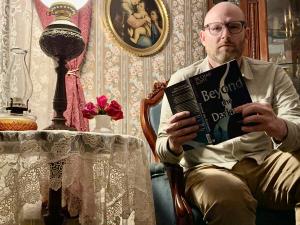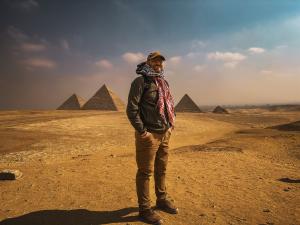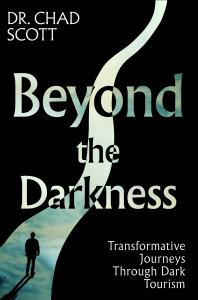Interview with Chad Scott, PhD: Exploring the Rise of Dark Tourism

Dr. Scott with his book, Beyond the Darkness, at the historic Lizzie Borden House in Fall River, Massachusetts.
Psychotherapist specializing in travel psychology and author of the critically acclaimed book Beyond the Darkness: Transformative Journeys Through Dark Tourism
Dark tourism isn’t about death. It’s about meaning. When we walk through the shadows of history with reverence, we don’t just learn what happened—we feel it. And that feeling can change how we live.”
MINNEAPOLIS, MN, UNITED STATES, November 7, 2025 /EINPresswire.com/ -- 1. Why do you think more people are interested in dark tourism right now?— Dr. Chad Scott
In our post-COVID world, we’re dealing with ongoing political unrest, natural disasters, and global conflicts. People are searching for meaning amid the chaos. Dark tourism offers a deeper kind of travel—one that goes beyond entertainment or relaxation. More people are choosing to visit places that hold emotional or historical weight because they want perspective. It helps them connect to something bigger than themselves.
2. What do people hope to get out of visiting these places?
When people visit sites of historic suffering—concentration camps, genocide memorials, or slave ports—with genuine reverence, these places can feel like they’re speaking to the visitor. Many feel a sense of duty to carry forward the memory of those who suffered. These moments become a kind of memento mori—a reminder of mortality—that pushes people to live with purpose, to love more deeply, and to fear less.
3. Some people worry that dark tourism can be disrespectful. Is that a valid concern?
Yes, and it depends on the context. Dark tourism spans a broad spectrum. Places like Salem or historic dungeons can be both fun and educational. But when it comes to sacred or tragic ground—such as cemeteries or genocide sites—visitors must bring a deep sense of respect. The issue arises when people visit serious sites with sensational or disrespectful motives. Some places may also be too recent or culturally sensitive for tourism, and that needs to be honored.
4. How can travelers and tour companies ensure they're being respectful?
Most travelers are naturally respectful when they understand expectations. Tour companies can help by providing briefings on etiquette, placing signs at entrances, and including cultural context in brochures. Social media posts and ads can also reinforce respectful behavior. Education is key.
5. Is social media helping or hurting dark tourism?
Both. Social media can be an incredible tool for education and empathy—but it can also amplify sensationalism or spread misinformation. Algorithms sometimes push content that distorts history or encourages superficial engagement. But when used thoughtfully, social platforms can inspire reflection and global awareness.
6. Are platforms like Instagram or TikTok changing how people experience these sites?
Absolutely. These platforms give dark tourism sites a voice and allow travelers to share personal, emotional experiences. That creates connection and fosters curiosity—especially among younger audiences. It can also bring these experiences to people who can’t physically travel. For many, this is their first emotional connection to history.
7. How are younger generations changing how we think about history and travel?
Younger travelers crave authenticity. They’re drawn to experiences that shape their identity and help them make sense of the world. Dark tourism often becomes a form of self-exploration. Instead of relying on filtered narratives, they seek truth from original sources—places where real history happened. Visiting sites of slavery, genocide, or authoritarian regimes helps them form their own understanding of the past, grounded in empathy.
8. What role can technology—like VR or virtual tours—play in dark tourism?
Technology is a game-changer. Virtual reality allows people to experience the emotional and historical gravity of a site without physically being there. These immersive experiences leave a lasting impression and can be especially impactful for people with physical or financial limitations. VR can help encode emotional memory in ways traditional media cannot.
9. Some tours are happening in recent conflict zones, like Ukraine. Is that ethical?
It’s a complex issue. If someone is visiting out of morbid curiosity, that’s unethical. If they’re going to help, that’s not tourism—that’s courage. There’s a grey area in between, and I advise people to listen to locals and victims. Travelers also need to reflect on their own motivations. Are they seeking understanding, or trying to fill a void? Either path can carry emotional risks and requires self-awareness.
10. How can travel companies support dark tourism in a responsible way?
I promote what I call reflective dark tourism—not just learning what happened, but feeling it. This kind of experience can transform lives, build resilience, and spark activism. Travel companies can play a big role by offering more than just facts. Include reflection prompts in brochures or on placards. Hire experts—like psychotherapists trained in travel psychology—to guide travelers through the emotional aspects. Gift shops can offer meaningful books instead of souvenirs. The goal is not just to inform, but to inspire.
11. What does the future of dark tourism look like?
Dark tourism is evolving. The term was coined by academics in the 1990s, and scholars like Dr. Philip Stone at the Institute for Dark Tourism Research in the UK continue to lead the way. I believe more people will travel for meaning rather than just pleasure. We’ll see the rise of emotionally immersive exhibits, virtual reality museums, and historically significant sites being preserved and opened to the public. The future of dark tourism is not about darkness—it’s about insight.
Discover More
To explore the deeper psychology of dark tourism and its power to transform how we see the world, visit DrChadScott.com
.
You can purchase Beyond the Darkness: Transformative Journeys Through Dark Tourism wherever books and audiobooks are sold.
Ryan Jones
Travel News Weekly
email us here
Legal Disclaimer:
EIN Presswire provides this news content "as is" without warranty of any kind. We do not accept any responsibility or liability for the accuracy, content, images, videos, licenses, completeness, legality, or reliability of the information contained in this article. If you have any complaints or copyright issues related to this article, kindly contact the author above.


